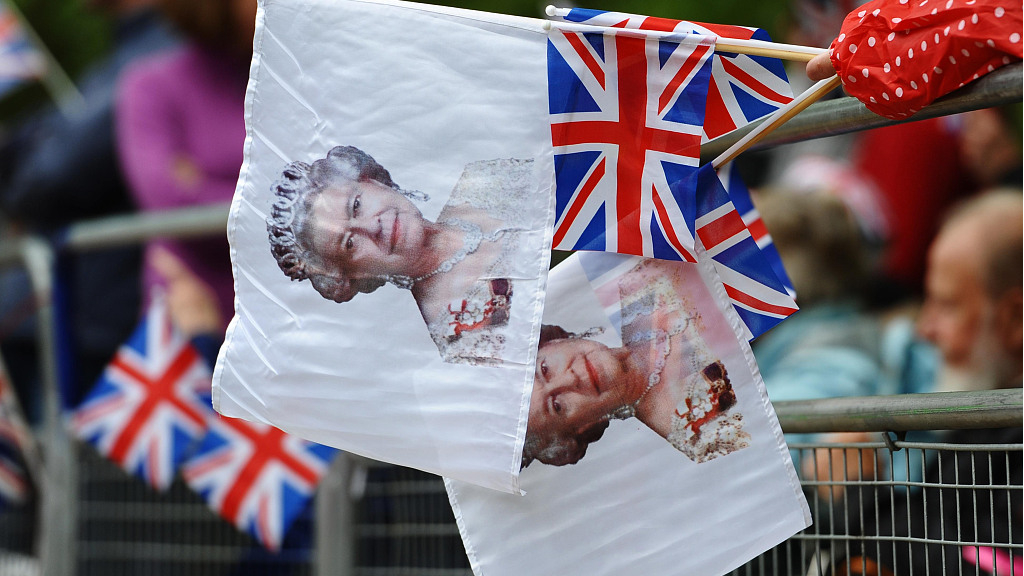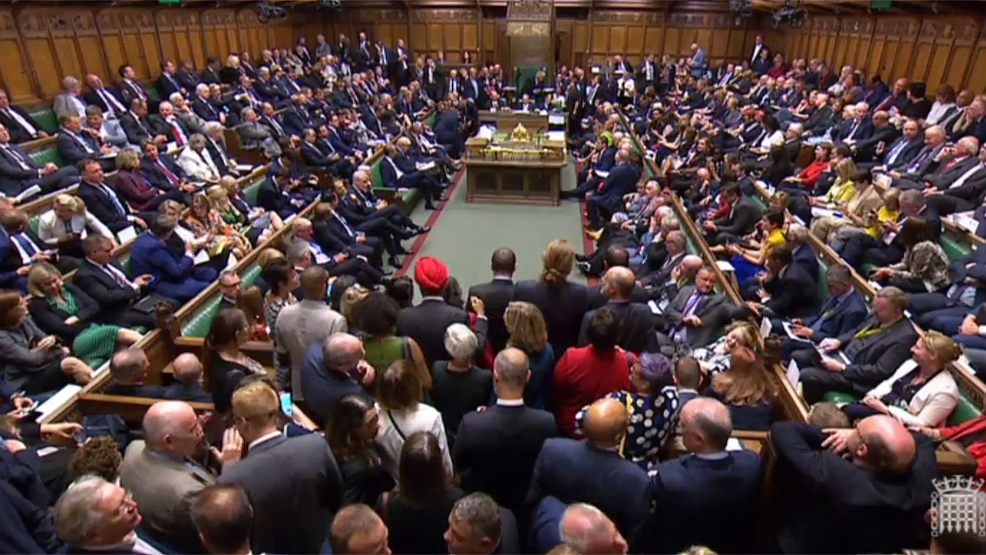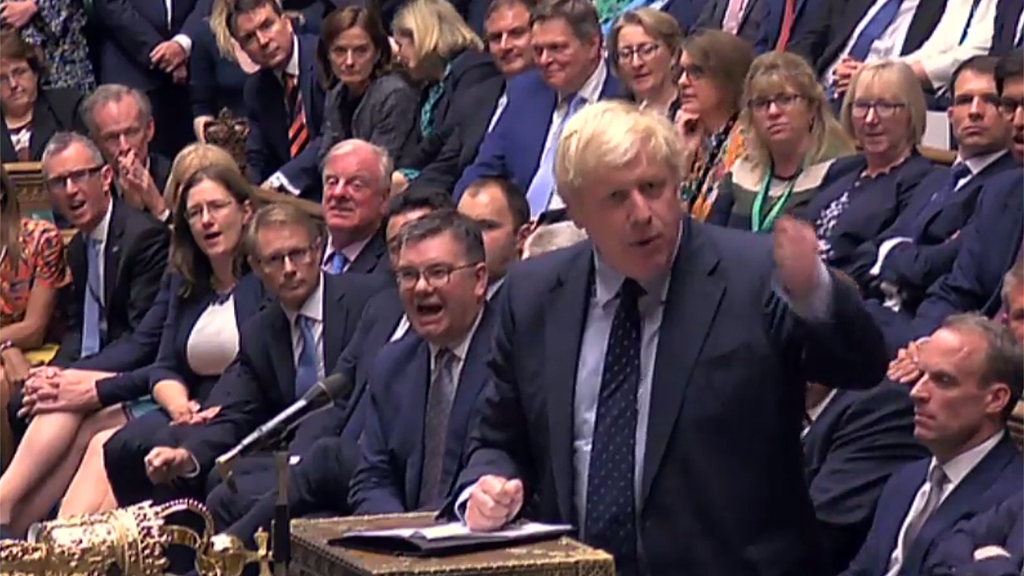

People holding Queen Elizabeth II and Union flags as they wait on the Mall for the carriage procession of the Queen's Diamond Jubilee in London, UK, June 5, 2012. /VCG Photo
With British lawmakers defeating Prime Minister Boris Johnson's Brexit strategy in Parliament on Tuesday, Queen Elizabeth II might have just been drawn much deeper into one of the biggest constitutional crisis during her long reign of 66 years.
Tuesday's events have also raised the prospect of a snap election pending a vote in Parliament on Wednesday.
The stage for the imminent crisis for the British monarch was set last Wednesday when in an extraordinary move, the Queen agreed to suspend – or prorogue – the British parliament for an unprecedented 23 working days on the constitutionally binding advice of the prime minister just ahead of the October 31 Brexit deadline.
The controversial five-week (September 10-October 13) prorogation of the parliament is being seen as Johnson's attempt to deny lawmakers a reasonable opportunity to debate and stop a no-deal Brexit in the parliament. The move has been slammed by the opposition and critics as "undemocratic" and sparked sporadic protests under the slogan #StopTheCoup.
With rival political party leaders, including the leader of opposition Jeremy Corbyn, petitioning for a direct audience with the Queen over her decision while others pressing for a legal charge against Johnson, analysts foresee a huge challenge, perhaps her biggest, facing the British monarch in the coming days.
According to some analysts Tuesday's showdown between the government and the parliament, in which Johnson’s strategy was defeated 328 vote to 301, could still trigger a situation that might require the Queen's endorsement, and tacitly, force her to take sides.
"This definitely puts the Queen in a potentially tricky position because it's drawing her into the most contentious and divisive political debate in the UK," Mike Gordon, professor of constitutional law at the University of Liverpool, told AFP.
A vote on holding an election is expected on Wednesday, although it is by no means certain to succeed as it requires the support of two-thirds of lawmakers and opposition. "The public will have to choose who goes to Brussels on October 17 to sort this out," Johnson said, referring to the crucial UK-EU meeting just two weeks before the Brexit deadline.
Alternately, emboldened by Tuesday's victory, experts say, British lawmakers may push to pass the promised legislation blocking the possibility of a no-deal Brexit. Labour leader Jeremy Corbyn has already warned that while he wanted an election, he wanted to get through the "no deal" legislation first. This could happen as early as Wednesday.
Queen vs. government vs. parliament

A video grab from footage broadcast by the UK Parliament's Parliamentary Recording Unit (PRU) shows members of parliament (MPs) waiting in the chamber for the result of the vote on the Standing Order 24 emergency debate on a no-deal Brexit in the House of Commons in London, UK, September 3, 2019. /VCG Photo
Related story: Queen approves UK parliament suspension, opposition denounces 'coup'
Read also: UK PM to suspend parliament until Oct. 14
If the lawmakers succeed in passing the legislation, experts feel it is likely that Johnson may then ask the Queen to withhold the "royal assent" – the official royal rubber-stamp – for that legislation to become law.
"And at that point we'll be in difficult constitutional territory," Gordon said, adding: "The convention she gives the royal assent to anything parliament will pass clashes with the convention she acts on ministerial advice."
The last monarch to refuse royal assent – signing the "Scottish Militia Bill" into law – was Queen Anne in 1708.
"The Queen is not meant to be put in this position. But she has been put into this position. So, then what do you do?" Fortune magazine quoted Jo Murkens, a constitution expert at London School of Economics, as saying.
"Cases where a monarch or representative did intervene against the wishes of the government tend to leave the monarch bruised. However, none quite translate to just how unusual the current political situation is, given it could set up a direct clash over who represents the people – the government or parliament – and which one the Queen ultimately sees as more legitimate," Murkens said.
The British constitution – which is unwritten but relies on precedent and convention – provides the monarch the right to be consulted, to warn and to encourage, but also mandates her to act on the advice of her ministers. This essentially means that the monarch has a titular function while the real executive authority is bestowed on the prime minister.
Queen Elizabeth II, who ascended to the throne in 1952, is Britain's longest-serving monarch and has rarely been drawn into political crises. The closest she came was the 1975 Australian constitutional crisis when her governor-general John Kerr sacked prime minister Gough Whitlam. She refused appeals to get involved.
The prorogation of parliament has already put the Queen in a difficult position, with anti-Brexit groups seeing her consent for Johnson's decision as having taken sides over Brexit.
"If the Queen is asked to help, she would do well to remember history doesn't look too kindly on royals who aid and abet the suspension of democracy," anti-Brexit group, Best for Britain, tweeted.
'Vulnerable constitution'

A video grab from footage broadcast by the UK Parliament's Parliamentary Recording Unit (PRU) shows British Prime Minister Boris Johnson responding to his defeat on Standing Order 24, an emergency debate on a no-deal Brexit in the House of Commons in London, UK, September 3, 2019. /VCG Photo
Related story: UK Parliament suspension: What will happen next?
Read also: Britain's constitutional crisis makes Brexit no more likely
Assessing the current political crisis in the UK for The Guardian newspaper, historian and political commentator Robert Saunders noted how the unwritten British constitution with an emphasis on convention and tradition has enough flexibility to evolve but at the same also remains "dangerously vulnerable to the abuse of power."
"The British constitution is unlike any other in the world. You cannot find it in a bookshop or read it online. It has no manual or handbook. Instead, it is a delicate assemblage of laws, practices and institutions, built over centuries and held together by a fragile tissue of customs, conventions and understandings," he said.
"It relies on trust and on a common commitment to its unwritten rules. That has allowed it to adapt and evolve, but leaves it dangerously vulnerable to the abuse of power," he reasoned.
With Johnson being attacked for showing brazen contempt for constitutional conventions and undermining democratic principles with his prorogation move, experts insist that the political quagmire over Brexit could potentially be the biggest constitutional crisis Britain and the Queen has faced in modern times and the one that would go straight to the heart of the future of the monarchy.
"The UK is a parliamentary democracy, in which 'the will of the people' flows through our elected representatives. Our claim to be democratically governed rests on this slender foundation: that a government must command the confidence of the elected chamber. By wielding the royal prerogative to silence parliament, Johnson has struck at the foundations of our democracy," Sauders said.
Meg Russel, director of the Constitution Unit, University College London, argued that it's hard to define what's "unconstitutional" in a system with an unwritten constitution, but stating her opinion in The Guardian, she nevertheless agreed that Johnson's move "is an executive power grab."
"The dangerous precedents that would be set by prorogation apply around the world. Governments must not be able to shut down democratic legislatures just in order to dodge inconvenient scrutiny," she contended.
(With input from AFP)

Copyright © 2018 CGTN. Beijing ICP prepared NO.16065310-3
Copyright © 2018 CGTN. Beijing ICP prepared NO.16065310-3